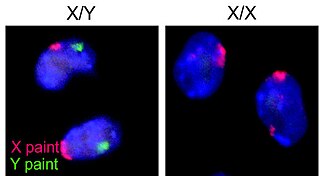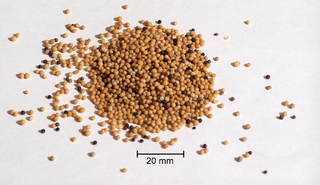Related Research Articles

Sex is the trait that determines whether a sexually reproducing organism produces male or female gametes. Male organisms produce small mobile gametes, while female organisms produce larger, non-mobile gametes. Organisms that produce both types of gametes are called hermaphrodites. During sexual reproduction, male and female gametes fuse to form zygotes, which develop into offspring that inherit traits from each parent.

In botany, a seed is a plant embryo and food reserve enclosed in a protective outer covering called a seed coat (testa). More generally, the term "seed" means anything that can be sown, which may include seed and husk or tuber. Seeds are the product of the ripened ovule, after the embryo sac is fertilized by sperm from pollen, forming a zygote. The embryo within a seed develops from the zygote and grows within the mother plant to a certain size before growth is halted.

Dianthus caryophyllus, commonly known as the carnation or clove pink, is a species of Dianthus native to the Mediterranean region. Its exact natural range is uncertain due to extensive cultivation over the last 2,000 years. Carnations are prized for their vibrant colors, delicate fringed petals, and enchanting fragrance.

In botany, apomixis is asexual reproduction without fertilization. Its etymology is Greek for "away from" + "mixing". This definition notably does not mention meiosis. Thus "normal asexual reproduction" of plants, such as propagation from cuttings or leaves, has never been considered to be apomixis, but replacement of the seed by a plantlet or replacement of the flower by bulbils were categorized as types of apomixis. Apomictically produced offspring are genetically identical to the parent plant.
Muthi is a traditional medicine practice in Southern Africa as far north as Lake Tanganyika.

Robert Anthony Plant is an English singer and songwriter. He was the lead singer and lyricist of the rock band Led Zeppelin from its founding in 1968 until their break up in 1980; since then he has had a successful solo career, sometimes collaborating with other artists such as Alison Krauss. Regarded by many as one of the greatest singers in rock music, he is known for his flamboyant persona and raw stage performances.

Mustard seeds are the small round seeds of various mustard plants. The seeds are usually about 1 to 2 millimetres in diameter and may be colored from yellowish white to black. They are an important spice in many regional foods and may come from one of three different plants: black mustard, brown mustard, or white mustard.

Sambucus is a genus of flowering plants in the family Adoxaceae. The various species are commonly referred to as elder, elderflower or elderberry. The genus was formerly placed in the honeysuckle family, Caprifoliaceae, but was reclassified as Adoxaceae due to genetic and morphological comparisons to plants in the genus Adoxa.

The egg cell, or ovum, is the female reproductive cell, or gamete, in most anisogamous organisms. The term is used when the female gamete is not capable of movement (non-motile). If the male gamete (sperm) is capable of movement, the type of sexual reproduction is also classified as oogamous. A nonmotile female gamete formed in the oogonium of some algae, fungi, oomycetes, or bryophytes is an oosphere. When fertilized the oosphere becomes the oospore.

Budding or blastogenesis is a type of asexual reproduction in which a new organism develops from an outgrowth or bud due to cell division at one particular site. For example, the small bulb-like projection coming out from the yeast cell is known as a bud. Since the reproduction is asexual, the newly created organism is a clone and excepting mutations is genetically identical to the parent organism. Organisms such as hydra use regenerative cells for reproduction in the process of budding.

Mother church or matrice is a term depicting the Christian Church as a mother in her functions of nourishing and protecting the believer. It may also refer to the primary church of a Christian denomination or diocese, i.e. a cathedral or a metropolitan church. For a particular individual, one's mother church is the church in which one received the sacrament of baptism. The term has specific meanings within different Christian traditions. Catholics refer to the Catholic Church as "Holy Mother Church".
Parent–offspring conflict (POC) is an expression coined in 1974 by Robert Trivers. It is used to describe the evolutionary conflict arising from differences in optimal parental investment (PI) in an offspring from the standpoint of the parent and the offspring. PI is any investment by the parent in an individual offspring that decreases the parent's ability to invest in other offspring, while the selected offspring's chance of surviving increases.

Dracaena trifasciata is a species of flowering plant in the family Asparagaceae, native to tropical West Africa from Nigeria east to the Congo. It is most commonly known as the snake plant, Saint George's sword, mother-in-law's tongue, and viper's bowstring hemp, among other names. Until 2017, it was known under the synonym Sansevieria trifasciata.

The Mother Orange Tree is the oldest living orange tree in Northern California. The California Historical Landmark is located at 400 Glen Drive in Oroville, California.
Microsporangia are sporangia that produce microspores that give rise to male gametophytes when they germinate. Microsporangia occur in all vascular plants that have heterosporic life cycles, such as seed plants, spike mosses and the aquatic fern genus not species Azolla. In gymnosperms and angiosperm anthers, the microsporangia produce microsporocytes, the microspore mother cells, which then produce four microspores through the process of meiosis. Microsporocytes are produced in the microsporangia of gymnosperm cones and the anthers of angiosperms. They are diploid microspore mother-cells, which then produce four haploid microspores through the process of meiosis. These become pollen grains, within which the microspores divide twice by mitosis to produce a very simple gametophyte.

Little Shop of Horrors is a 1986 American horror comedy musical film directed by Frank Oz. It is an adaptation of the 1982 off-Broadway musical of the same name by composer Alan Menken and writer Howard Ashman, which is itself an adaptation of the 1960 film The Little Shop of Horrors by director Roger Corman. The film, which centers on a floral shop worker who discovers a sentient carnivorous plant that feeds on human blood, stars Rick Moranis, Ellen Greene, Vincent Gardenia, Steve Martin, and the voice of Levi Stubbs. The film also features special appearances by Jim Belushi, John Candy, Christopher Guest and Bill Murray. It was produced by David Geffen through The Geffen Company and released by Warner Bros. on December 19, 1986.

A leaf miner is any one of numerous species of insects in which the larval stage lives in, and eats, the leaf tissue of plants. The vast majority of leaf-mining insects are moths (Lepidoptera), sawflies, and flies (Diptera). Some beetles also exhibit this behavior.

The Dasheri mango is a mango cultivar which originated in a village near Kakori in Lucknow district in 18th century. It is a sweet and fragrant variety of mango grown in North India, the southern state Andhra Pradesh, Nepal and Pakistan. Malihabad in Uttar Pradesh is the largest producer.

Tulsi Gowda is an Indian environmentalist from Honnali village, Ankola taluk in Karnataka state. She has planted more than 30,000 saplings and looks after the nurseries of the Forest Department. Her work has been honoured by the Government of India and other organisations. In 2021, the Government of India awarded her the Padma Shri, the country's fourth highest civilian award. She is known as the "Encyclopedia of the Forest" for her ability to recognise the mother tree of any species of tree.
References
- ↑ "Mother plants" . Retrieved 23 January 2010.